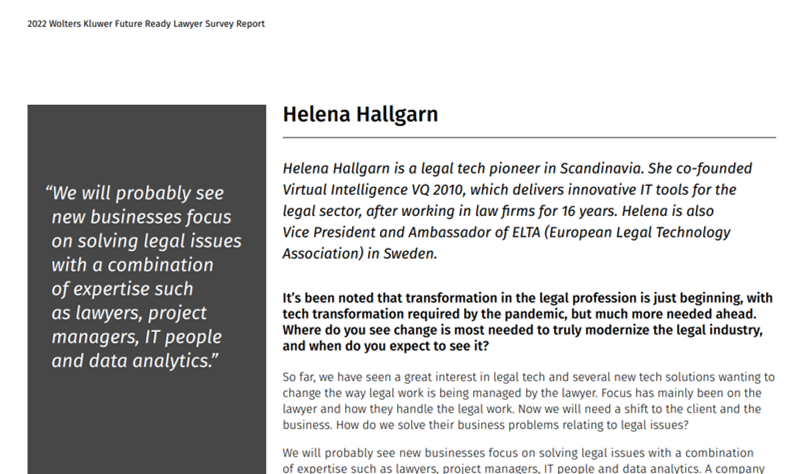In the 2022 Wolters Kluwer “Future Ready Lawyer Survey: Leading Change Report” more than 750 legal professionals across Europe and US has been asked about their views on leading legal industry trends, the changing client-firm relationship and the changing legal department and law firm respectively, legal technology as a performance driver, competitive advantages and talent challenges.
As the survey results shows, technology continues to be a critical differentiator for higher performance in the legal sector, and demand continues to grow. Successful legal tech implementation makes law firms more profitable, with 63% of ‘technology leading’ firms reporting profitability increases over the past year, compared to only 46% of other firms that have put less emphasis on tech adoption.
The increased use of and investment in technology solutions continued in 2022 and are projected to gain more ground ahead. Corporate legal departments – faced with higher workloads and budget constraints – have turned to technology to automate work and improve productivity. Law firms, confronted with changing client expectations, the demand for higher productivity and growing competition, are also turning to technology for help.
Technology Leaders (organizations that most effectively leverage technology) thrive. Year after year, they outperform other organizations across several important metrics and demonstrate why investing in and applying the right technology matters. 63% of technology leading law firms report their profitability increased over the past year – more than any other firms.
Furthermore, lawyers want to work in tech-savvy legal organizations. 87% of corporate lawyers and 83% of law firm lawyers say it is extremely or very important for them to work for an organization that fully leverages technology. Today’s talent has very high expectations for access to the latest tools, and technology that enables agility, change and the ability to work remotely.

At the end of the report (page 33 and onwards) are some more indepth interviews with four legal tech experts, Robert Ambrogi who is a Massachusetts lawyer and journalist who has been covering legal technology and the web for more than 20 years, primarily through his blog LawSitesBlog.com and now also his podcast LawNext.com, Jean P. O’Grady, who is a thought leader in the legal tech community and the author of the DeweyBStrategic.com blog as well as a member of the New York State Bar with over 30 years of experience developing strategic information initiatives for Am Law 100 law firms, Martin O’Malley, who is CEO of Wolters Kluwer Legal & Regulatory with 25 years of experience leading global organizations serving professionals, Marcus M. Schmitt, who is a lawyer in Germany and General Manager of the European Company Lawyers Association (ECLA) and Ambassador in the European Legal Technology Association (ELTA) with more than 15 years of experience in the legal industry focusing on digital transformation, innovation in corporate legal departments, Richard Tromans, who is founder of the Artificial Lawyer news site, founding consultant of TromansConsulting, and founder and chair of the Changing Legal Think Tank, Jeroen Zweers, who has more than 25 years of experience in the legal industry and who is the founder of NOUN, a legal transformation agency, co-founder of Dutch Legal Tech, vice-president of the European Legal Technology Association (ELTA), as well as having been named among the top 10 European legal innovators by Financial Times, and our very own Helena Hallgarn, who is a legal tech pioneer in Scandinavia, vice-president of the European Legal Technology Association (ELTA) and co-founder together with Ann Björk of Virtual Intelligence VQ, which delivers innovative IT tools for the legal sector.
Here are some of the insights that Helena Hallgarn provided in the report:
Last year’s positive hype around legal tech has resulted in law firms investing in all
kinds of legal tech tools. Many law firms now have access to document management
systems, different kinds of workflow systems, document assembly systems and all the
functionality from basic programs such as Excel. Instead of just implementing new
technologies, they should use the ones they have better. Considering having access to
all these technology tools and platforms, there is a great possibility to truly modernize
the business.
To proceed with this modernization of the business, focus ought to be on standardization.
Without standardization you cannot proceed successfully with workflow and automation.
Therefore, the next step in the transformation of the business ought to be a look at the
business to find out what can be standardized.
Law firms working with standardization can get better use of their technology. Once
tasks and matters are standardized and supported by tech, the time spent for managing
these tasks are much more predictable. That makes it possible to also change the pricing
model for that kind of work to a fixed price model. That will truly modernize
their business.
We will also probably see new businesses focus on solving legal issues with a combination of expertise such as lawyers, project managers, IT people and data analytics.
As concluded in the report, legal organisations that fully leverage technology outperform organisations that do not.
Download the full report here: 2022 SURVEY REPORT The Wolters Kluwer Future Ready Lawyer: Leading Change
We also recommend this article by Artificial Lawyer for further analysis of the report:
Legal Tech Can Make You More Profitable – Wolters Kluwer Report

